Thermal Energy Transfer
Sustainable Home Design: Heat Pump Systems Efficiency Revealed
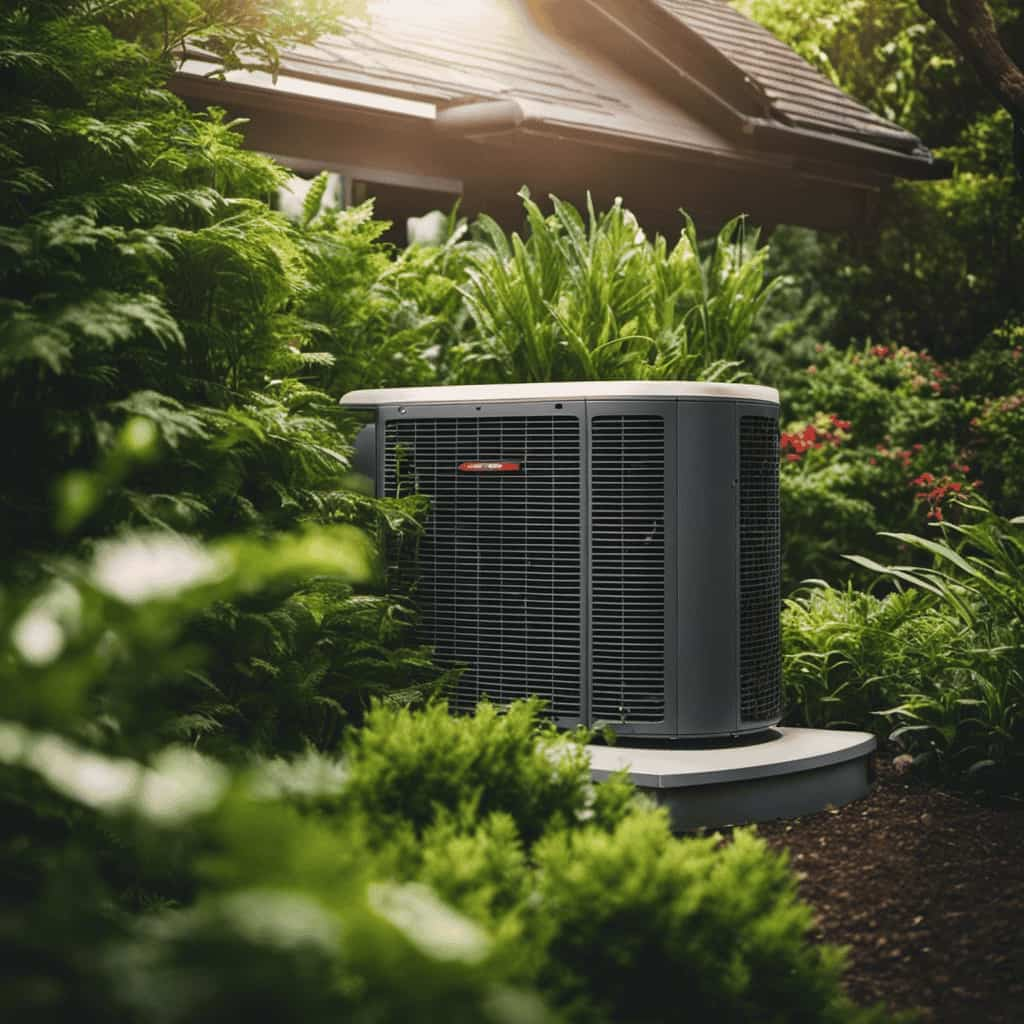
We believed we had a thorough understanding of sustainable home design, but our perspective changed when we learned about the impressive efficiency of heat pump systems.
In this article, we reveal the hidden benefits and secrets of these remarkable systems. From understanding energy efficiency ratings to tips for designing a sustainable home, we’ll guide you through the process of maximizing energy savings.
Prepare to be amazed by the innovations in heat pump technology that can transform your home into an eco-friendly haven.
Let’s dive into the world of heat pump systems and uncover their true potential.

Key Takeaways
- Heat pump systems significantly reduce energy consumption.
- Choosing a system with high SEER and HSPF ratings ensures maximum energy efficiency.
- Proper insulation and optimal system sizing are crucial for efficient heating and cooling.
- Regular maintenance helps maintain optimal system performance and energy efficiency.
The Benefits of Heat Pump Systems in Sustainable Home Design
One of the key benefits of heat pump systems in sustainable home design is that they can significantly reduce energy consumption. This advantage is especially important in today’s world, where energy efficiency is a top priority. By using heat pump systems, homeowners can lower their energy bills and reduce their carbon footprint.
Case studies have shown that these systems can achieve energy savings of up to 50% compared to traditional heating and cooling methods. Additionally, heat pump systems provide both heating and cooling capabilities, eliminating the need for separate systems and saving space.
They also offer precise temperature control and can be easily integrated with renewable energy sources such as solar panels. Overall, heat pump systems are a practical and efficient choice for sustainable home design.
Understanding Energy Efficiency Ratings for Heat Pump Systems
When it comes to understanding energy efficiency ratings for heat pump systems, we need to consider factors such as the Seasonal Energy Efficiency Ratio (SEER) and the Heating Seasonal Performance Factor (HSPF). These ratings are important in evaluating the performance of a heat pump system.

The SEER measures the cooling efficiency of the system during the cooling season, while the HSPF measures the heating efficiency during the heating season. Higher SEER and HSPF ratings indicate greater energy efficiency, which means lower energy consumption and cost savings.
It’s crucial to consider these ratings when choosing a heat pump system for your sustainable home. By opting for a system with high SEER and HSPF ratings, you can ensure maximum energy efficiency and reduce your environmental impact.
In the next section, we’ll discuss tips and considerations for designing a sustainable home with heat pump systems.
Designing a Sustainable Home With Heat Pump Systems: Tips and Considerations
To maximize the energy efficiency of our sustainable home, we should consider various tips and considerations when designing it with heat pump systems. Here are three key factors to keep in mind:

-
Proper insulation: Insulating your home effectively is crucial for reducing heat loss and ensuring that your heat pump system operates efficiently. Insulate walls, floors, and roofs to minimize heat transfer and maintain a comfortable indoor temperature.
-
Optimal system sizing: It’s important to choose the right size heat pump system for your home. Oversized systems can lead to inefficient operation, while undersized systems may struggle to meet your heating and cooling needs. Work with a professional to determine the appropriate size for your specific requirements.
-
Renewable energy integration: Consider integrating renewable energy sources, such as solar panels or wind turbines, with your heat pump system. This allows you to harness clean energy and further reduce your carbon footprint.
Maximizing Energy Savings Through Proper Heat Pump System Sizing
To maximize our energy savings, we need to ensure that our heat pump system is properly sized for our home. A heat pump that is too small will struggle to heat or cool our space efficiently, while a system that is too large will cycle on and off frequently, leading to increased energy consumption and wear and tear on the equipment. Proper heat pump sizing involves considering factors such as the size and layout of our home, insulation levels, and climate conditions. Consulting with a professional during the heat pump installation process is crucial to ensure accurate sizing. Additionally, regular heat pump maintenance, including cleaning filters and checking refrigerant levels, will help maintain optimal system performance and energy efficiency.
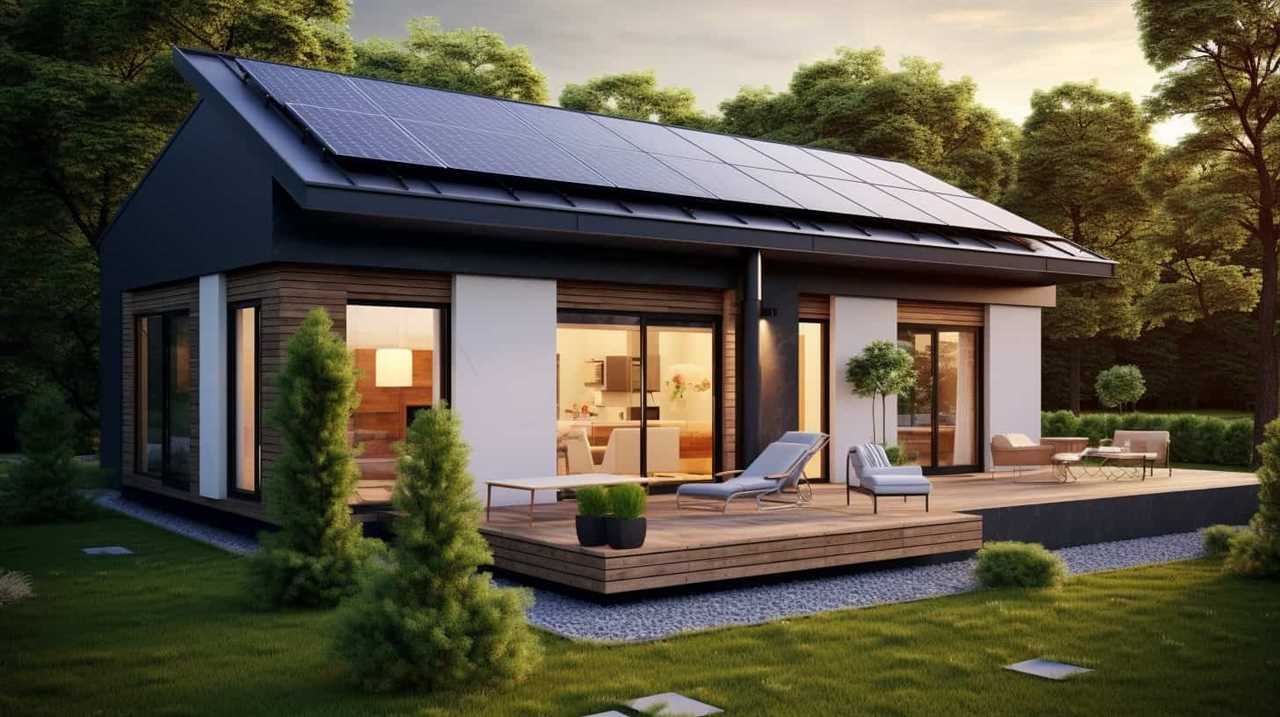
| Factors to Consider for Proper Heat Pump Sizing | |
|---|---|
| Size and layout of our home | Insulation levels |
| Climate conditions | |
| Consultation with a professional during installation | Regular heat pump maintenance |
Innovations in Heat Pump Technology for Sustainable Home Design
We have witnessed remarkable advancements in heat pump technology, revolutionizing sustainable home design. These innovations have brought about significant improvements in the efficiency and performance of heat pump systems, making them an increasingly attractive option for homeowners looking to integrate renewable energy sources into their homes.
Here are three key advancements in heat pump technology:
-
Variable speed compressors: These allow heat pumps to adjust their speed based on the heating or cooling needs of a home, resulting in more precise temperature control and increased energy efficiency.
-
Improved refrigerants: Newer heat pumps use environmentally friendly refrigerants that have a lower impact on the ozone layer and contribute less to global warming.

-
Smart controls and connectivity: Heat pumps now come equipped with smart thermostats and connectivity features, allowing homeowners to remotely control and monitor their systems, optimizing energy usage and reducing costs.
With these advancements, heat pump systems are now a reliable and efficient solution for sustainable home design, offering homeowners the opportunity to reduce their carbon footprint and save on energy bills.
Frequently Asked Questions
Are Heat Pump Systems Suitable for All Types of Homes, or Are There Specific Requirements?
Heat pump systems can be suitable for most homes, but specific requirements, such as adequate insulation and proper sizing, should be met. Consider heat pump system installation costs and the environmental impact when deciding on sustainability.
How Long Do Heat Pump Systems Typically Last Before Needing to Be Replaced?
Heat pump systems typically last around 15-20 years before needing replacement. Factors that affect their lifespan include proper maintenance, usage patterns, and the quality of the system’s components.
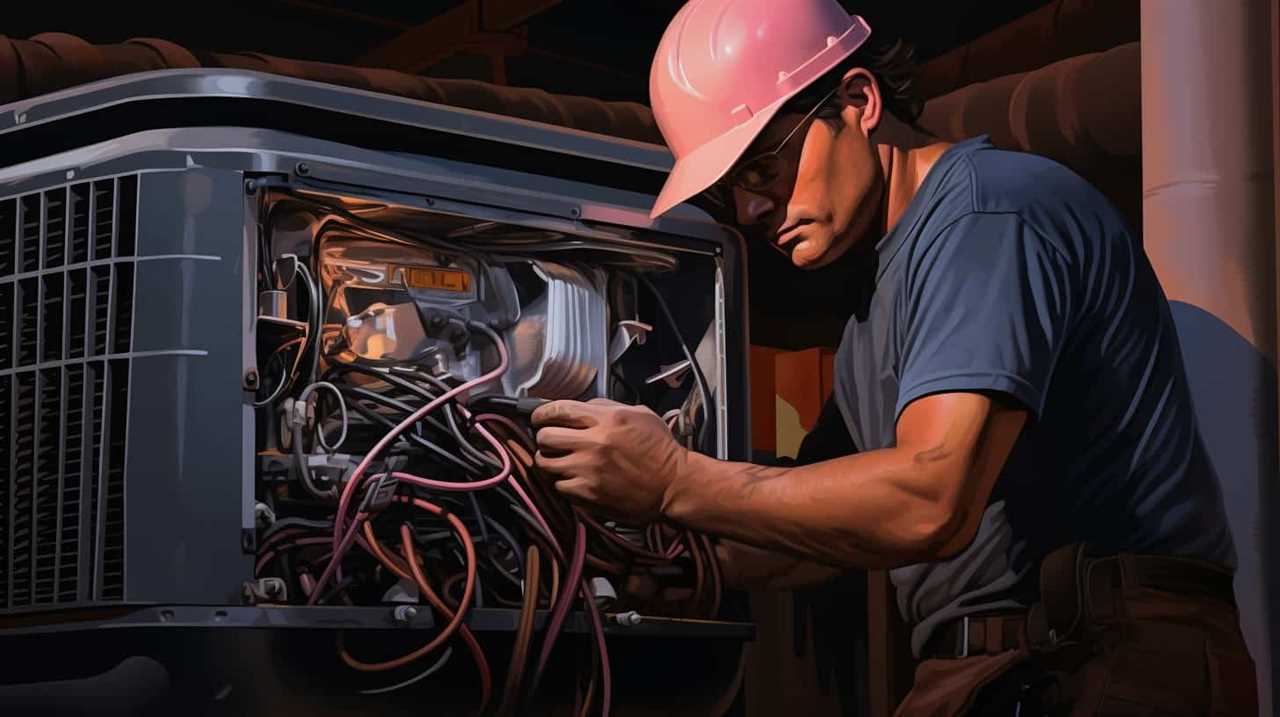
Can Heat Pump Systems Be Used for Both Heating and Cooling Purposes?
Yes, heat pump systems can be used for both heating and cooling purposes. They offer efficient temperature control in our homes. The benefits of using these systems include energy savings and a comfortable living environment.
Are There Any Government Incentives or Rebates Available for Homeowners Who Choose to Install Heat Pump Systems?
Government incentives and rebates are available for homeowners who install heat pump systems. These incentives are designed to encourage energy savings and make sustainable home design more accessible and affordable for everyone.
Are There Any Maintenance Requirements or Costs Associated With Heat Pump Systems?
Maintaining heat pump systems requires regular maintenance to ensure optimal performance. Costs associated with maintenance include filter replacements, annual inspections, and occasional repairs. However, these costs are outweighed by the long-term energy savings and environmental benefits.
Conclusion
In conclusion, heat pump systems are a symbol of efficiency and sustainability in home design.

Their energy efficiency ratings and innovative technology make them a practical choice for those seeking to reduce their environmental impact.
By properly sizing the system and considering tips for sustainable design, homeowners can maximize energy savings and create a comfortable living space.
So, let’s embrace the power of heat pump systems and build a greener future for our homes.
Thermal Energy Transfer
Boost Heat Pump Efficiency: Renewable Energy’s Unexpected Power

Are you prepared to unleash the complete capabilities of your heat pump? Search no more! In this article, we will delve into the surprising impact of renewable energy on enhancing heat pump effectiveness.
Get ready to revolutionize your heating system as we delve into the role of solar energy, harnessing geothermal power, the game-changing wind energy, sustainable biomass solutions, and the untapped potential of hydropower.
Prepare to master the art of maximizing heat pump performance with the help of renewable energy sources.
Key Takeaways
- Solar panel integration allows for the direct conversion of sunlight into electricity, reducing reliance on traditional power sources.
- Geothermal energy can maximize heat pump performance by providing heat stored beneath the Earth’s surface, leading to higher levels of efficiency.
- Wind power can revolutionize heat pump efficiency by generating electricity to power heat pumps, reducing their carbon footprint.
- Biomass combined with heat pump technology greatly enhances efficiency and sustainability, reducing reliance on fossil fuels and emitting fewer greenhouse gases.
The Role of Solar Energy in Enhancing Heat Pump Efficiency
We can enhance heat pump efficiency by utilizing solar energy. Solar panel integration plays a crucial role in harnessing renewable energy for heat pumps. By connecting solar panels to heat pump systems, we can directly convert sunlight into electricity, reducing reliance on traditional power sources. This integration allows heat pumps to operate more efficiently, as they can draw power from the solar panels during daylight hours.
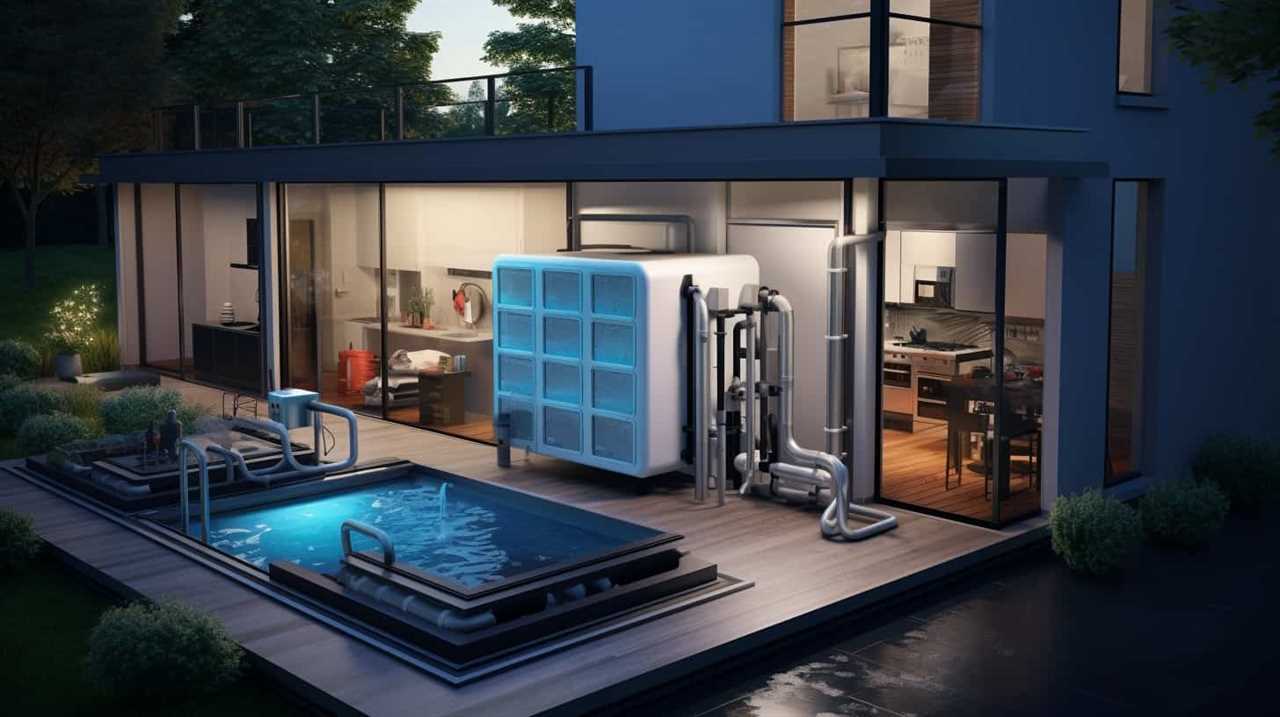
Additionally, energy storage solutions can further optimize heat pump performance. Storing excess solar energy in batteries or other storage systems ensures a continuous power supply for heat pumps, even when sunlight is limited.
This combination of solar panel integration and energy storage solutions maximizes the utilization of renewable energy, significantly improving heat pump efficiency.
Harnessing Geothermal Power to Maximize Heat Pump Performance
One way to maximize heat pump performance is by harnessing the power of geothermal energy. Geothermal energy is heat that is stored beneath the Earth’s surface in geothermal reservoirs. This heat can be extracted and used to provide heating and cooling for buildings. Geothermal innovations have made it possible to tap into this renewable energy source and optimize the efficiency of heat pumps.
By utilizing geothermal energy, heat pumps can achieve higher levels of efficiency compared to traditional heating and cooling systems. The table below illustrates the advantages of harnessing geothermal power for heat pump performance:
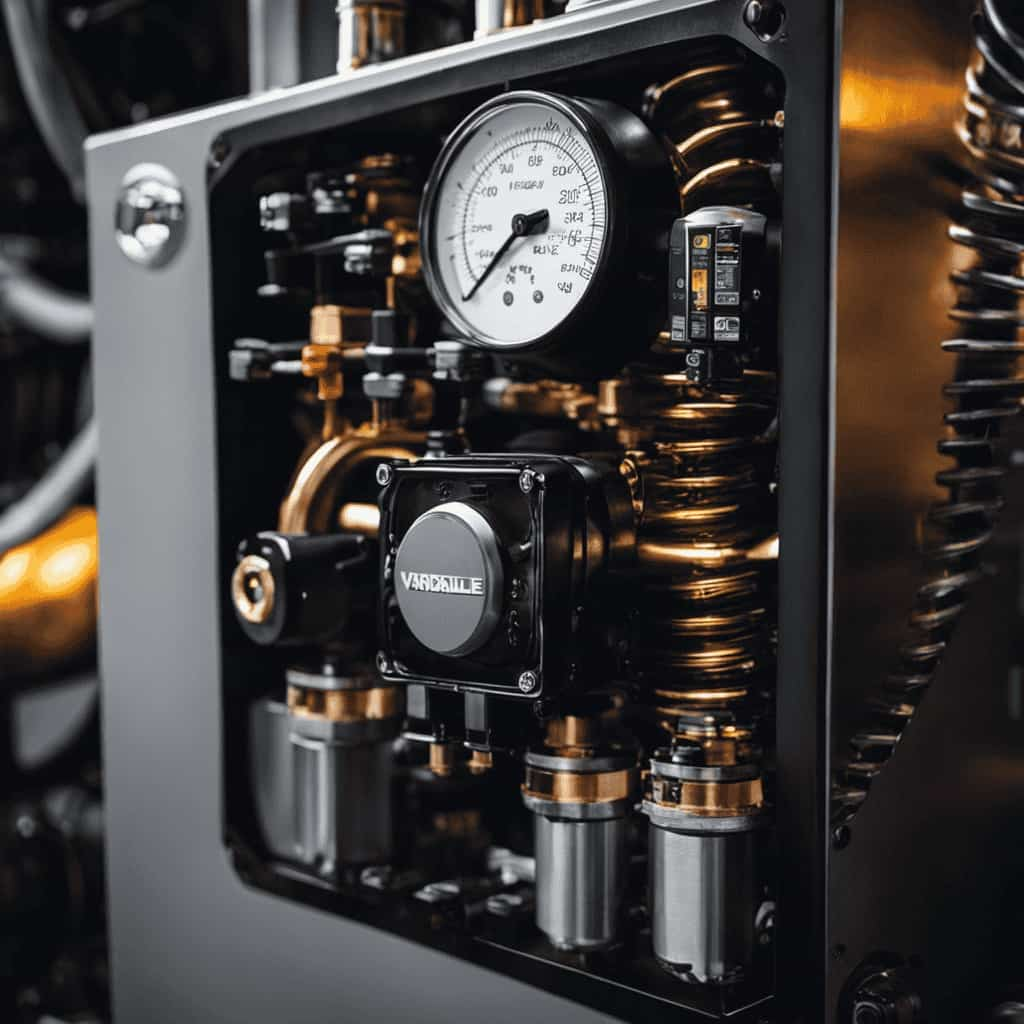
| Advantages of Geothermal Power for Heat Pump Performance |
|---|
| Higher efficiency |
| Reduced energy consumption |
| Lower operating costs |
| Environmentally friendly |
Harnessing geothermal power not only improves the performance of heat pumps but also contributes to a more sustainable and energy-efficient future. By utilizing the abundant geothermal resources available, we can maximize the efficiency of heat pumps and reduce our carbon footprint.
Wind Energy: A Game-Changer for Heat Pump Efficiency
Harnessing wind energy can revolutionize heat pump efficiency.
Wind energy has the potential to be a game changer for heat pump technology, offering significant benefits to renewable energy solutions.
By utilizing wind power to generate electricity, heat pumps can operate more efficiently and reduce their carbon footprint.

Wind turbines can produce large amounts of electricity, which can be used to power heat pumps, allowing them to operate at higher efficiencies.
Additionally, wind energy is a clean and renewable source, making it an environmentally friendly option for heat pump systems.
The integration of wind energy into heat pump technology enhances the overall performance and sustainability of these systems.
Biomass: A Sustainable Solution for Boosting Heat Pump Efficiency
Using biomass as a renewable fuel source and combining it with heat pump technology can greatly enhance efficiency and sustainability. Biomass, which refers to organic materials such as wood, agricultural residues, and dedicated energy crops, offers a promising alternative fuel for heat pumps. By harnessing the energy stored in biomass, heat pumps can provide a reliable and efficient heating solution while reducing reliance on fossil fuels. The innovative combination of biomass and heat pump technology allows for a more sustainable heating system that emits fewer greenhouse gases and decreases overall energy consumption. To illustrate the potential benefits of this approach, consider the table below, which compares the energy efficiency and carbon emissions of biomass-powered heat pumps to conventional heating systems.
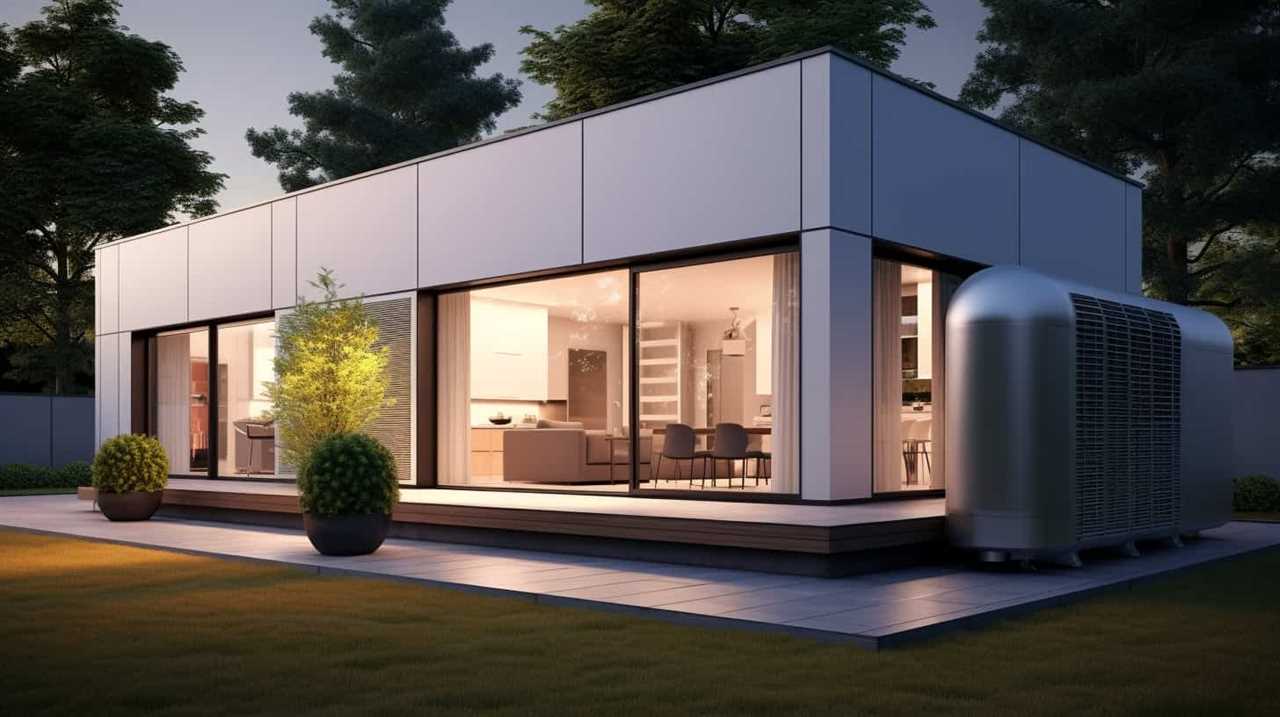
| Heating System | Energy Efficiency (COP) | Carbon Emissions (kgCO2/MWh) |
|---|---|---|
| Biomass Heat Pump | 4.5 | 10 |
| Natural Gas Boiler | 0.9 | 200 |
| Oil Boiler | 0.85 | 250 |
| Electric Resistance | 1 | 500 |
| Air-Source Heat Pump | 3 | 60 |
As shown in the table, biomass heat pumps have a significantly higher energy efficiency and lower carbon emissions compared to other heating systems. This makes them an attractive and sustainable solution for boosting heat pump efficiency.
Hydropower: Unleashing the Potential of Water to Improve Heat Pump Performance
We can maximize heat pump performance by tapping into the immense potential of hydropower, using water as a renewable energy source. Hydropower, also known as hydroelectric power, offers several advantages in improving heat pump efficiency.
- Water Efficiency:
- Hydropower utilizes the natural flow of water, harnessing its kinetic energy to generate electricity.
- This process doesn’t consume water, making it a highly water-efficient energy source.
- Heat pumps can benefit from this water efficiency by leveraging hydropower for their operations, reducing overall water consumption.
- Hydroelectric Power:
- Hydropower plants can generate a significant amount of electricity, providing a reliable and consistent power source for heat pumps.
- The scalability of hydropower allows for large-scale generation, accommodating the increasing demand for heat pump installations.
- By integrating hydropower into heat pump systems, we can enhance their performance and contribute to a more sustainable and efficient energy ecosystem.
Harnessing the power of water through hydropower can significantly improve heat pump performance, ensuring optimal energy utilization and reducing environmental impact.
Frequently Asked Questions
What Are the Key Factors to Consider When Choosing a Heat Pump for Optimal Efficiency?
When choosing a heat pump for optimal efficiency, key factors to consider include heat pump installation and heat pump sizing. These factors play a crucial role in maximizing energy efficiency and ensuring optimal performance.
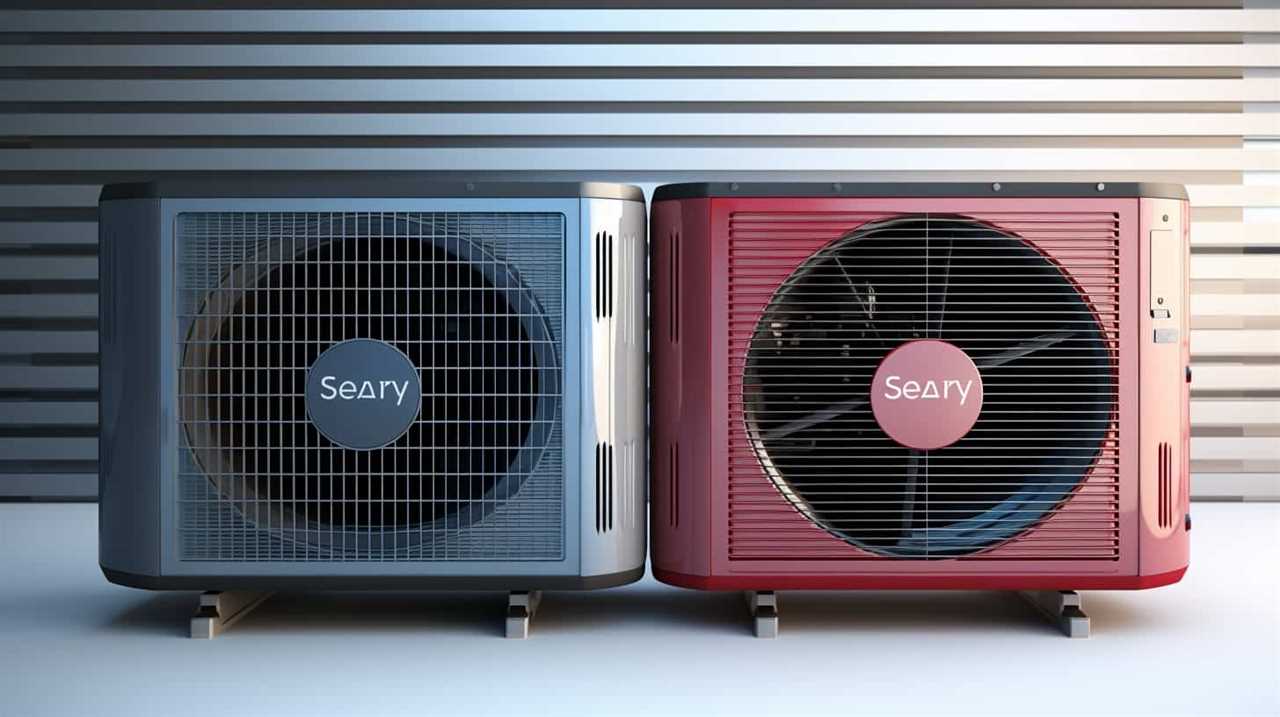
Can Heat Pumps Be Used in All Types of Climates or Are They More Suitable for Specific Regions?
Heat pumps can be used in all types of climates, but their efficiency may vary in extreme conditions. Some limitations include reduced performance in very cold regions and the need for additional heating sources.
Are There Any Government Incentives or Tax Credits Available for Installing Heat Pumps?
There are government incentives and tax credits available for installing heat pumps. These incentives can significantly reduce the upfront cost and make renewable energy more accessible to homeowners and businesses.
How Long Does It Typically Take for a Heat Pump to Pay for Itself in Terms of Energy Savings?
The heat pump payback period depends on various factors, including energy costs, climate, and insulation. It typically takes about 5-10 years for a heat pump to pay for itself in terms of energy savings.
Are There Any Maintenance Requirements or Recommended Practices to Ensure the Long-Term Efficiency of a Heat Pump?
To ensure long-term efficiency, heat pumps require regular maintenance and adherence to recommended practices. These include cleaning or replacing air filters, checking refrigerant levels, and inspecting electrical components. Neglecting these requirements can result in decreased performance and higher energy consumption.

Conclusion
In conclusion, renewable energy sources such as solar, geothermal, wind, biomass, and hydropower play a crucial role in boosting heat pump efficiency.
One interesting statistic to note is that harnessing solar energy can increase heat pump performance by up to 40%, while utilizing geothermal power can improve efficiency by up to 50%.
These renewable energy solutions not only provide sustainable alternatives to traditional heating methods but also contribute to a more energy-efficient and environmentally friendly future.
Thermal Energy Transfer
Decoding Heat Pumps’ Energy Efficiency Ratings: A Guide

Welcome to our guide on understanding the energy efficiency ratings of heat pumps! Have you ever been confused by the numbers and acronyms? We’re here to assist you.
In this article, we’ll break down the importance of energy efficiency ratings, how they’re calculated, and the key metrics to look out for.
We’ll also provide tips on maximizing your heat pump’s performance.
So, let’s dive in and uncover the secrets to choosing the most efficient heat pump for your needs.
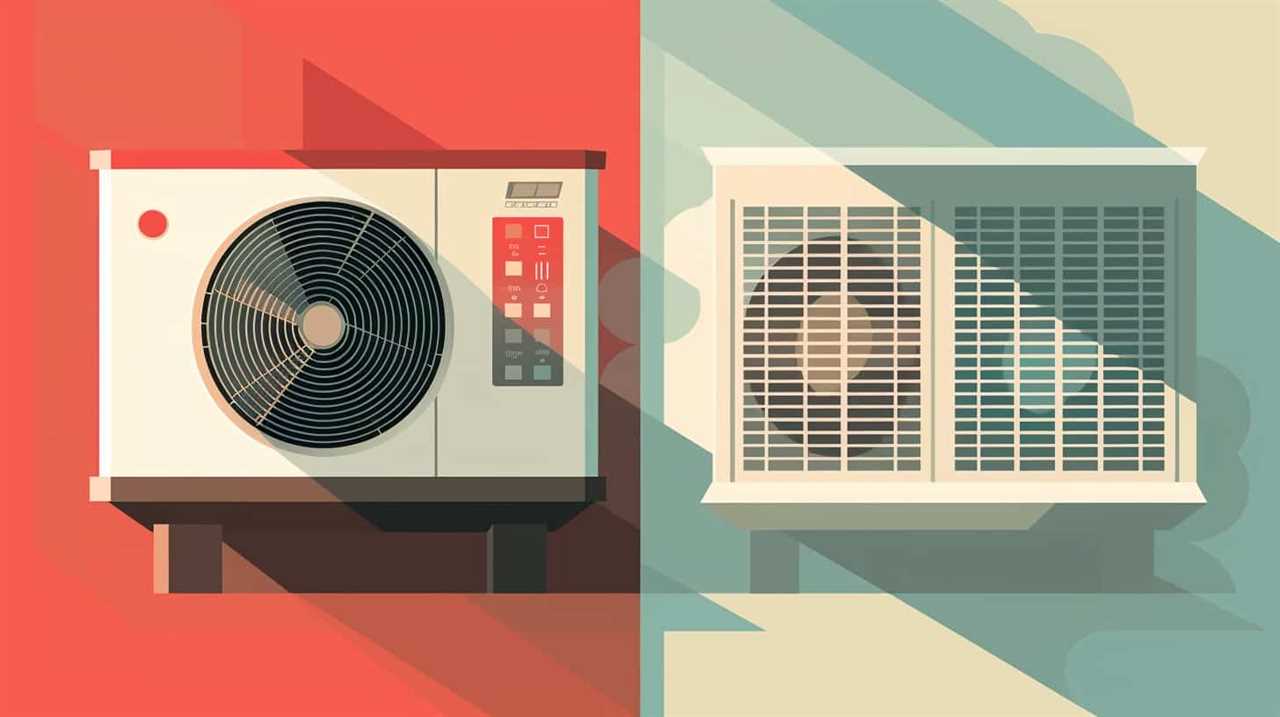
Key Takeaways
- Energy efficiency ratings are important in determining the effectiveness and cost savings of heat pumps.
- Higher efficiency ratings indicate lower energy consumption and can lead to reduced energy bills.
- Heat pumps with higher efficiency ratings often qualify for rebates and incentives.
- Evaluating energy efficiency ratings helps in making informed decisions and maximizing the benefits of heat pumps.
The Importance of Energy Efficiency Ratings in Heat Pumps
We believe that energy efficiency ratings play a crucial role in determining the effectiveness of heat pumps. When evaluating energy savings and long-term cost benefits, it’s important to consider the efficiency rating of a heat pump.
An energy efficiency rating provides a measure of how effectively a heat pump converts electricity into heat. Higher efficiency ratings indicate that the heat pump is more efficient in converting energy, resulting in lower energy consumption and ultimately, cost savings.
By choosing a heat pump with a high energy efficiency rating, homeowners can reduce their energy bills and minimize their environmental impact. Additionally, heat pumps with higher efficiency ratings often qualify for rebates and incentives, further enhancing the long-term cost benefits.
Evaluating energy efficiency ratings is therefore essential in making informed decisions and maximizing the benefits of heat pump technology.

How Energy Efficiency Ratings Are Calculated for Heat Pumps
To determine the energy efficiency rating of a heat pump, manufacturers use standardized testing procedures to measure its performance and calculate the ratio of heat output to electricity input. This calculation process takes into account various factors that affect the efficiency of the heat pump.
Here are some of the factors considered:
- Seasonal Energy Efficiency Ratio (SEER): This measures the cooling efficiency of the heat pump during the cooling season.
- Heating Seasonal Performance Factor (HSPF): This measures the heating efficiency of the heat pump during the heating season.
- Coefficient of Performance (COP): This measures the overall efficiency of the heat pump by considering both the cooling and heating modes.
Understanding SEER and HSPF: Key Energy Efficiency Metrics for Heat Pumps
SEER and HSPF are important energy efficiency metrics that help consumers understand the performance of heat pumps.
When it comes to evaluating the energy efficiency of heat pumps, it’s essential to understand the differences between SEER and HSPF ratings.

SEER, or Seasonal Energy Efficiency Ratio, measures the cooling efficiency of the heat pump. It calculates the amount of cooling output divided by the energy input over a cooling season. The higher the SEER rating, the more energy-efficient the heat pump is in cooling mode.
On the other hand, HSPF, or Heating Seasonal Performance Factor, measures the heating efficiency of the heat pump. It calculates the amount of heating output divided by the energy input over a heating season. A higher HSPF rating indicates better heating efficiency.
Both SEER and HSPF ratings are important when evaluating the energy efficiency of heat pumps. The choice between the two depends on the climate and the specific heating and cooling needs of the consumer. In warmer climates, where cooling demands are higher, SEER rating becomes more important. In colder climates, where heating demands are higher, HSPF rating is more significant.
To make an informed decision, it’s crucial to consider both SEER and HSPF ratings in order to choose a heat pump that meets your specific energy efficiency needs.

Comparing Energy Efficiency Ratings: What to Look for in Heat Pump Models
When comparing energy efficiency ratings, it’s important to regularly and carefully examine the different features of heat pump models. Here are three key aspects to consider when evaluating energy efficiency in heat pump models:
-
Seasonal Energy Efficiency Ratio (SEER): This rating measures the cooling efficiency of the heat pump. Look for a higher SEER rating, as it indicates better energy efficiency and lower operating costs during the cooling season.
-
Heating Seasonal Performance Factor (HSPF): HSPF measures the heating efficiency of the heat pump. A higher HSPF rating means better energy efficiency and lower heating costs during the heating season.
-
Energy Star Certification: Look for heat pump models that have earned the Energy Star certification. These models meet strict energy efficiency guidelines set by the Environmental Protection Agency (EPA) and can help you save on energy usage and costs.
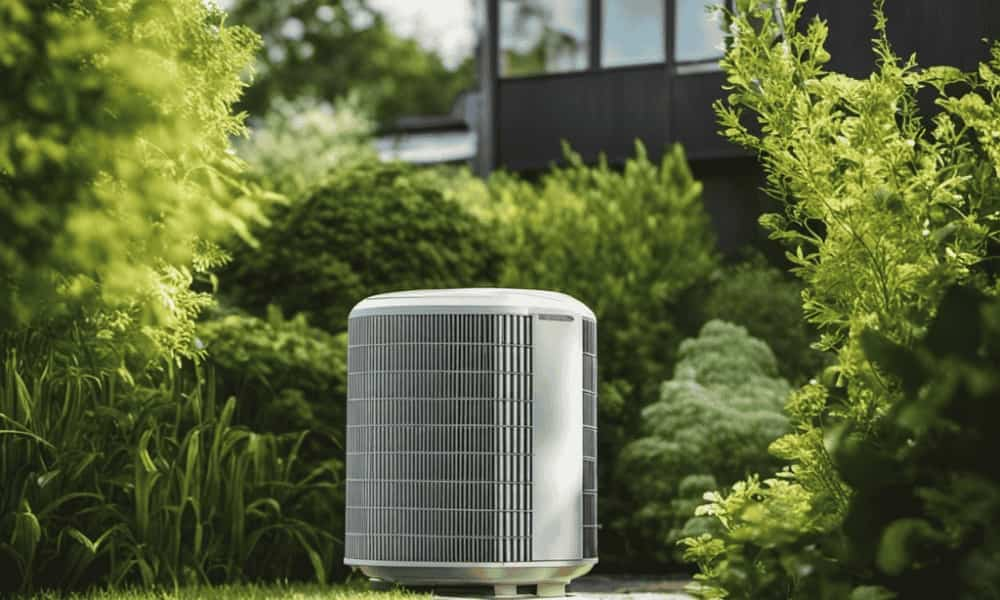
By considering these factors, you can make an informed decision when selecting a heat pump model that prioritizes energy efficiency.
In the next section, we’ll explore tips for maximizing energy efficiency and improving heat pump performance.
Maximizing Energy Efficiency: Tips for Improving Heat Pump Performance
To ensure that we get the most out of our heat pump and maximize its energy efficiency, we should implement these tips for improving its performance. First, regular maintenance is crucial for optimal operation. This includes cleaning or replacing air filters, inspecting and cleaning coils, and checking refrigerant levels. By keeping our heat pump in top condition, we can ensure that it operates efficiently and effectively. Additionally, optimizing the settings on our heat pump can make a significant difference in energy efficiency. Adjusting the thermostat to an appropriate temperature and utilizing programmable settings can help reduce energy consumption. It is also important to consider the size and placement of our heat pump, as these factors can impact its efficiency. By following these tips, we can improve the performance of our heat pump and save on energy costs.
| Tips for Improving Heat Pump Performance |
|---|
| Regular maintenance such as cleaning or replacing air filters, inspecting and cleaning coils, and checking refrigerant levels. |
| Optimizing settings on the heat pump, adjusting the thermostat to an appropriate temperature, and utilizing programmable settings. |
| Considering the size and placement of the heat pump to ensure maximum efficiency. |
Frequently Asked Questions
Are All Heat Pumps Required to Have an Energy Efficiency Rating?
Yes, all heat pumps are required to have an energy efficiency rating. Government regulations and industry standards mandate the inclusion of this rating to provide consumers with information about the product’s energy efficiency performance.
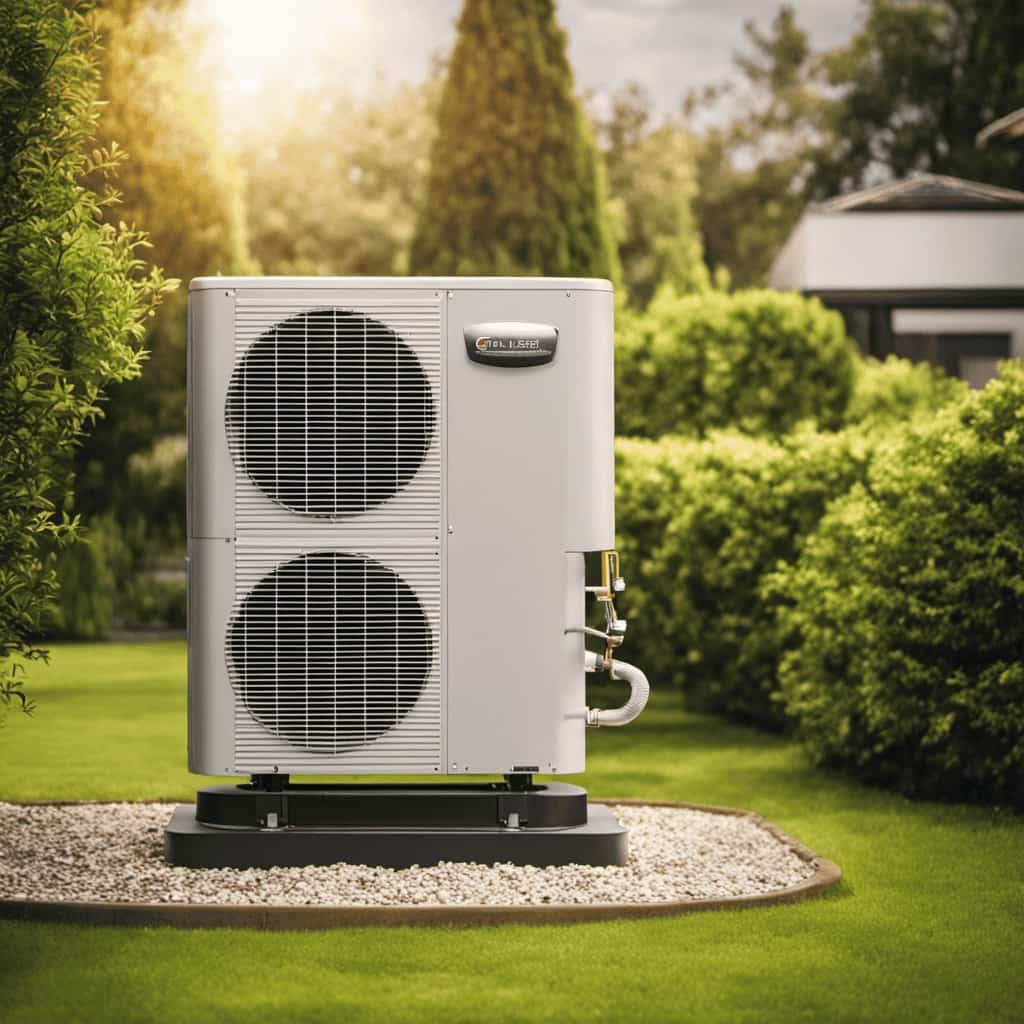
Can the Energy Efficiency Rating of a Heat Pump Change Over Time?
Yes, the energy efficiency rating of a heat pump can change over time due to various factors affecting efficiency. These factors include regular maintenance, age of the equipment, and advancements in technology.
How Can I Determine the Energy Efficiency Rating of My Existing Heat Pump?
To determine the energy efficiency rating of our existing heat pump, we can calculate the efficiency ratio by dividing the output heating or cooling energy by the input electrical energy.
Are There Any Government Incentives or Rebates Available for Purchasing a High-Efficiency Heat Pump?
Yes, there are government incentives and heat pump rebates available for purchasing a high-efficiency heat pump. These incentives and rebates can help reduce the cost and make it more affordable for homeowners to upgrade their heating systems.
Does the Location or Climate Affect the Energy Efficiency Rating of a Heat Pump?
In certain climates, heat pump efficiency ratings can be affected by the location. Additionally, proper installation is crucial for maximizing efficiency. These factors highlight the importance of considering climate and installation when evaluating a heat pump’s energy efficiency.

Conclusion
In conclusion, understanding energy efficiency ratings is crucial when evaluating heat pump options. By decoding SEER and HSPF metrics, consumers can make informed decisions that align with their energy-saving goals.
Comparing ratings and considering tips for maximizing efficiency ensures optimal performance.
Just as a skilled conductor coordinates an orchestra to create a harmonious symphony, homeowners who choose a heat pump with high energy efficiency ratings can enjoy a synchronized blend of comfort and cost savings.
Thermal Energy Transfer
Revolutionary Heat Pumps: A Sustainable Home Essential

Picture a world where we can warm and cool our homes while also benefiting the environment. This world is not just a dream, thanks to innovative heat pumps.
These sustainable home essentials offer incredible benefits, improving energy efficiency and reducing our carbon footprint.
In this article, we’ll explore the latest innovations in heat pump technology and show you how to maximize their energy efficiency in your own home.
Get ready to take a leap towards a greener, more sustainable future.
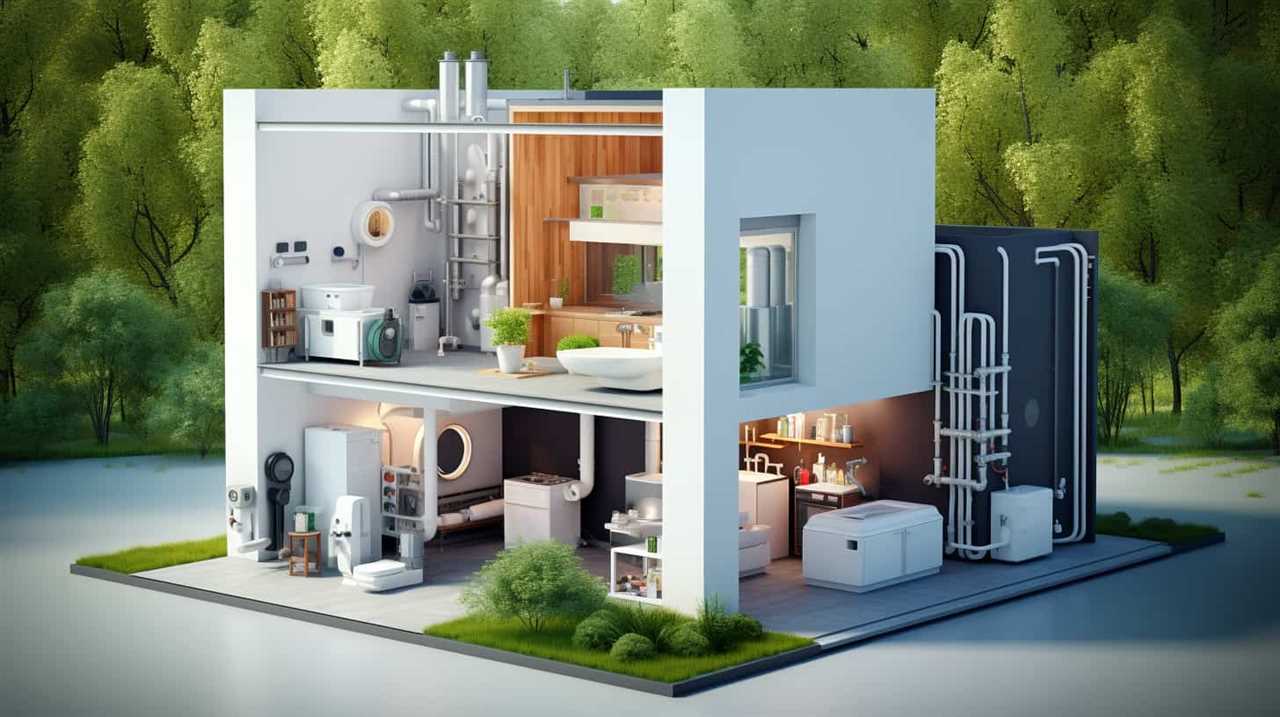
Key Takeaways
- Revolutionary heat pumps improve indoor air quality and filter out pollutants and allergens.
- They are highly energy efficient, resulting in reduced carbon emissions and a lower carbon footprint.
- They provide consistent heating and cooling throughout the year, contributing to a more sustainable planet.
- Energy efficient heat pumps improve sustainable home design by reducing energy consumption, improving indoor air quality, and offering financial incentives.
The Benefits of Revolutionary Heat Pumps
We’ve discovered the incredible benefits of using revolutionary heat pumps in our homes. These innovative systems not only provide efficient heating and cooling, but they also have a positive impact on our indoor air quality and the environment.
One of the key advantages of heat pumps is their ability to improve indoor air quality. Unlike traditional HVAC systems that recirculate air, heat pumps continuously bring in fresh outdoor air, filtering out pollutants and allergens in the process. This ensures that the air we breathe indoors is cleaner and healthier.
Additionally, heat pumps are highly energy efficient, resulting in reduced carbon emissions. By harnessing renewable energy sources such as air or ground heat, these systems significantly lower our carbon footprint, helping us contribute to a more sustainable planet.
How Energy Efficient Heat Pumps Improve Sustainable Home Design
Our goal is to showcase how energy efficient heat pumps can improve the design of sustainable homes. By incorporating innovations in geothermal heating, heat pumps provide several benefits that enhance the overall sustainability of a home:

-
Reduced energy consumption: Energy efficient heat pumps use less electricity compared to traditional heating systems, resulting in lower energy bills and reduced carbon emissions.
-
Improved indoor air quality: Heat pumps have built-in air filters that remove pollutants and allergens, ensuring cleaner and healthier indoor air.
-
Enhanced comfort: Heat pumps provide consistent heating and cooling throughout the year, maintaining a comfortable indoor environment regardless of the outside temperature.
-
Financial incentives: Many governments and utility companies offer heat pump rebates and incentives to promote their adoption, making them more affordable and attractive for homeowners.

Exploring the Latest Innovations in Heat Pump Technology
With advancements in technology and a growing emphasis on sustainability, heat pump technology has evolved significantly, providing homeowners with more efficient and eco-friendly heating and cooling solutions.
The latest innovations in heat pump technology have focused on improving energy efficiency, reducing environmental impact, and enhancing user experience.
One notable advancement is the integration of smart technology into heat pump systems, allowing for remote control and monitoring through mobile applications. This enables homeowners to adjust settings and monitor energy usage even when they’re away from home.
Another innovative feature is the use of variable-speed compressors, which optimize performance by adjusting the speed of the compressor to match the heating or cooling demand. This results in greater energy efficiency and improved comfort.

Additionally, advancements in heat pump maintenance have made it easier for homeowners to keep their systems running smoothly. Regularly cleaning or replacing air filters, checking refrigerant levels, and scheduling professional maintenance can help ensure optimal performance and extend the lifespan of the heat pump system.
Maximizing Heat Pump Energy Efficiency in Your Home
To maximize energy efficiency in your home, it’s important to implement strategies that optimize the performance of your heat pump system. Here are four key steps you can take to improve insulation and optimize system performance:
-
Seal air leaks: Inspect your home for any gaps or cracks in windows, doors, and walls. Use weatherstripping and caulking to seal these leaks and prevent heat loss.
-
Upgrade insulation: Improve your home’s insulation by adding insulation to the walls, attic, and basement. This will help reduce heat transfer and keep your home comfortable year-round.
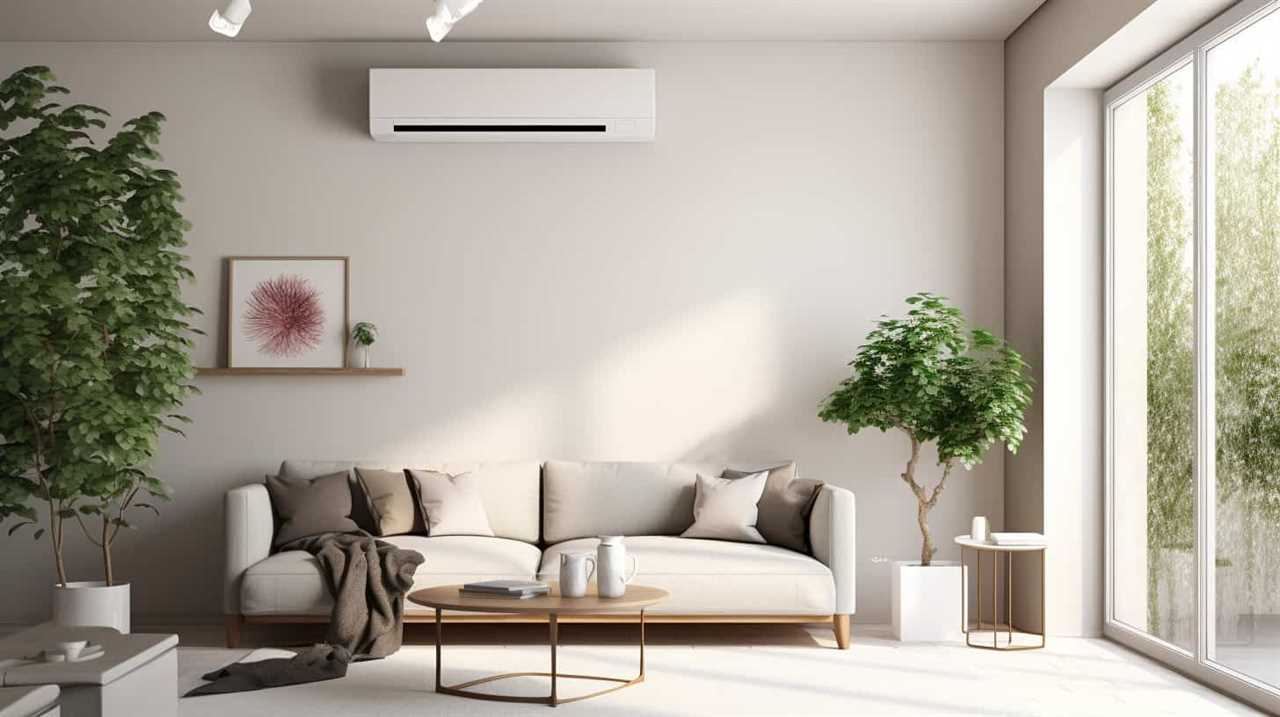
-
Maintain your heat pump: Regularly clean and replace air filters to ensure optimal airflow. Schedule professional maintenance to check for any issues and ensure your system is running efficiently.
-
Use a programmable thermostat: Set your thermostat to adjust temperatures when you’re away or asleep. This will help save energy and optimize your heat pump’s performance.
Key Considerations for Choosing the Right Heat Pump for Your Sustainable Home
When selecting a heat pump for our sustainable home, it’s essential to consider key factors such as efficiency, size, and compatibility with renewable energy sources.
Efficiency is crucial to ensure optimal energy usage and reduce environmental impact. Look for heat pumps with high Seasonal Energy Efficiency Ratio (SEER) and Heating Seasonal Performance Factor (HSPF) ratings.
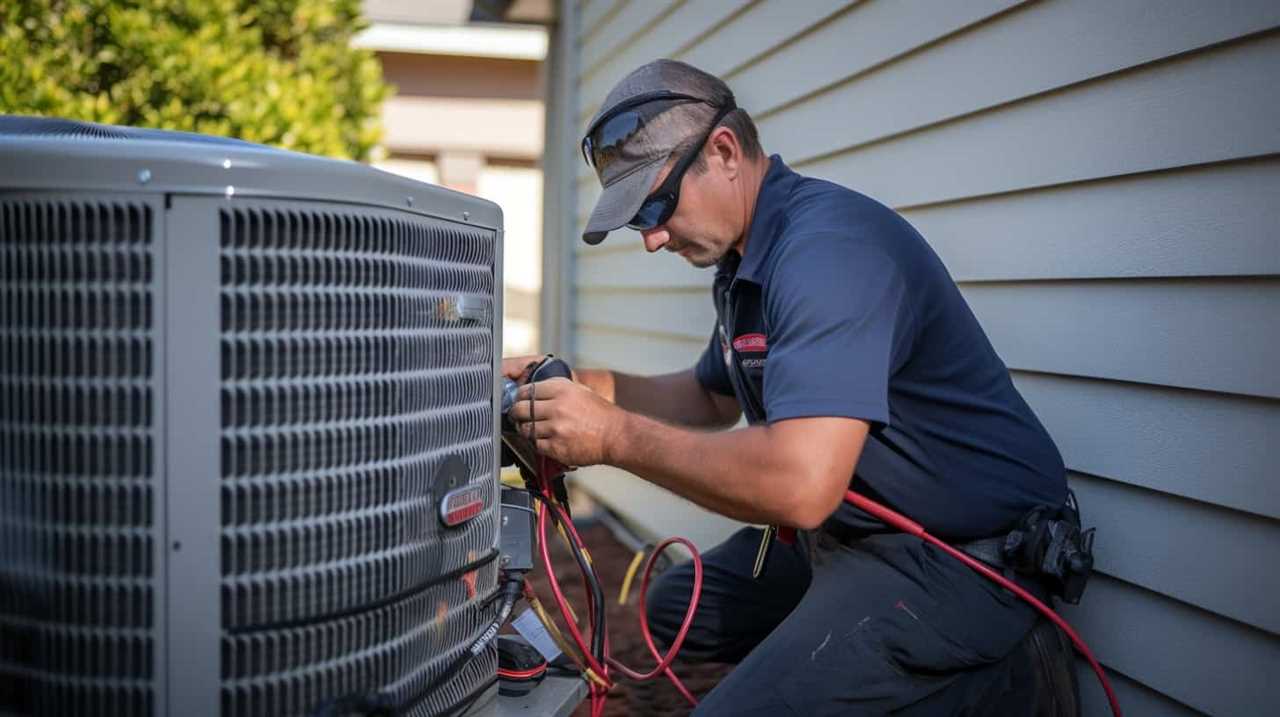
Additionally, consider the size of the heat pump, taking into account the square footage of your home and the climate in your region. Oversized or undersized heat pumps can lead to inefficiency and increased energy consumption.
Lastly, ensure that the heat pump is compatible with renewable energy sources like solar panels or wind turbines. This will maximize the sustainability of your home and reduce reliance on traditional energy sources.
Frequently Asked Questions
How Much Does a Revolutionary Heat Pump Cost?
When considering the cost of a revolutionary heat pump, it is crucial to compare it with traditional heating systems. While the initial investment may be higher, the long-term energy efficiency and cost savings make it a sustainable home essential.
Can a Heat Pump Be Used for Both Heating and Cooling Purposes?
Yes, a heat pump can be used for both heating and cooling purposes. The efficiency of heat pumps makes them beneficial for sustainable homes. They provide comfort while reducing energy consumption, like a gentle breeze on a warm summer day.
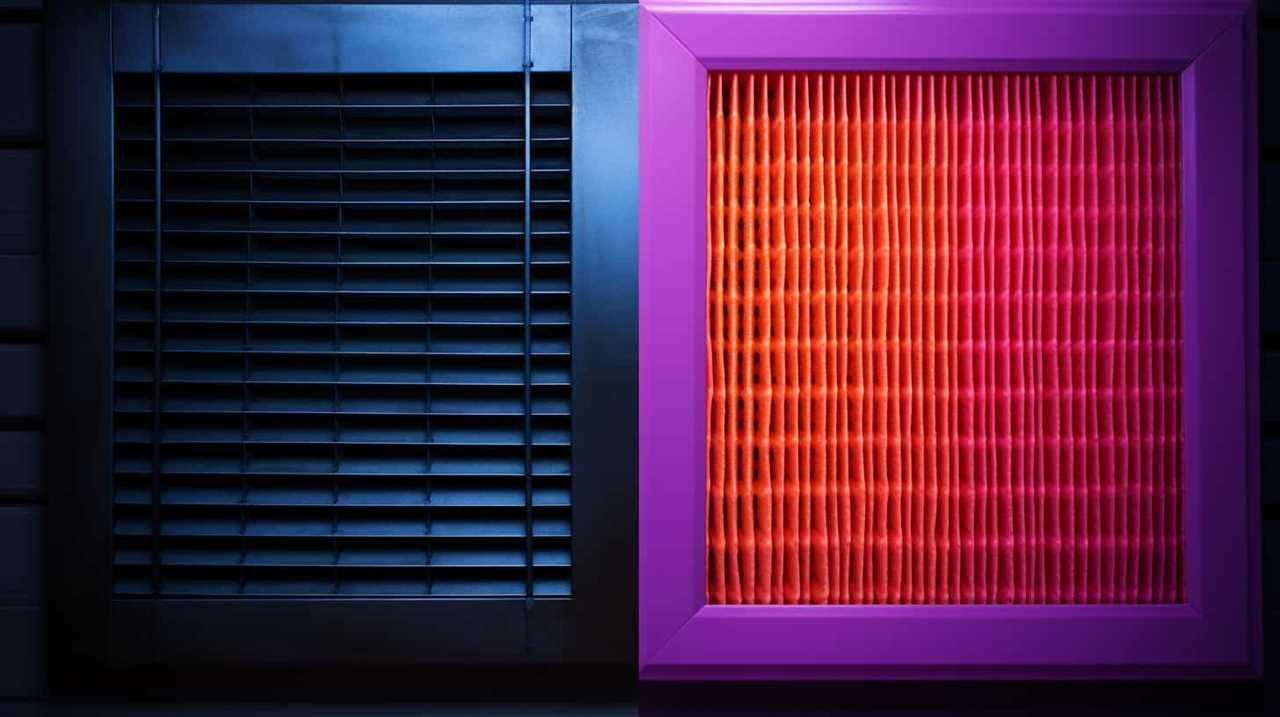
Are There Any Government Incentives or Rebates Available for Installing a Heat Pump?
Yes, there are government incentives and heat pump rebates available for installation. They provide financial support to make heat pumps more affordable and encourage their use in sustainable homes.
How Long Does It Take to Install a Heat Pump in a Sustainable Home?
Installation timelines for heat pumps in sustainable homes vary depending on factors such as the size of the home and the complexity of the installation. However, the process typically takes a few days to complete. The energy efficiency benefits make it worth the wait.
What Maintenance Is Required for a Heat Pump and How Often Should It Be Performed?
Heat pump maintenance is crucial for optimal performance. Regular maintenance should be performed to ensure efficiency and prevent costly repairs. We recommend scheduling maintenance at least once a year to keep your heat pump in top shape.
Conclusion
In conclusion, revolutionary heat pumps are an absolute must-have for any sustainable home.
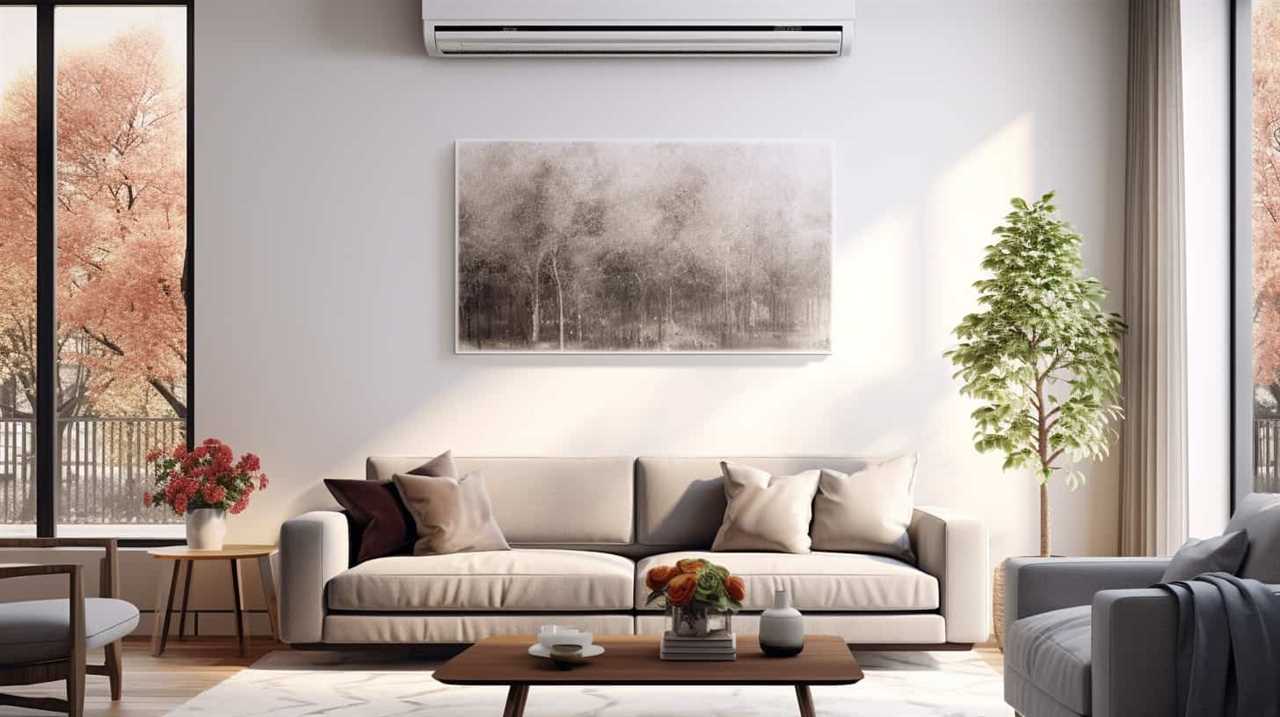
Their energy efficiency and innovative technology make them a game-changer in reducing carbon emissions and lowering energy costs.
With their ability to maximize heat pump energy efficiency, these remarkable devices are the key to achieving a truly sustainable home.
Don’t miss out on this groundbreaking technology – invest in a heat pump today and join the movement towards a greener future.
-

 Residential and Commercial Applications2 weeks ago
Residential and Commercial Applications2 weeks agoBest Amana Heat Pump Reviews
-

 Thermal Energy Transfer2 weeks ago
Thermal Energy Transfer2 weeks agoBreakthroughs in Modern Heat Pump Systems: Thermal Energy Edition
-

 Residential and Commercial Applications2 weeks ago
Residential and Commercial Applications2 weeks agoBest Heat Pump
-

 Geothermal Heat Pumps3 months ago
Geothermal Heat Pumps3 months agoUpgrade Your Comfort with Our Efficient HVAC Systems
-

 Air Conditioning3 months ago
Air Conditioning3 months agoExploring Energy-Efficient Air Conditioning Heat Pumps
-

 Geothermal Heat Pumps3 months ago
Geothermal Heat Pumps3 months agoInnovative Geothermal Heat Pump Manufacturers Revolutionize Energy Efficiency
-

 Thermal Energy Transfer1 month ago
Thermal Energy Transfer1 month agoBoost Your Heat Pump Efficiency: Interactive Guide
-

 Residential and Commercial Applications2 weeks ago
Residential and Commercial Applications2 weeks agoBest Portable Heat Pump Heat & AC










